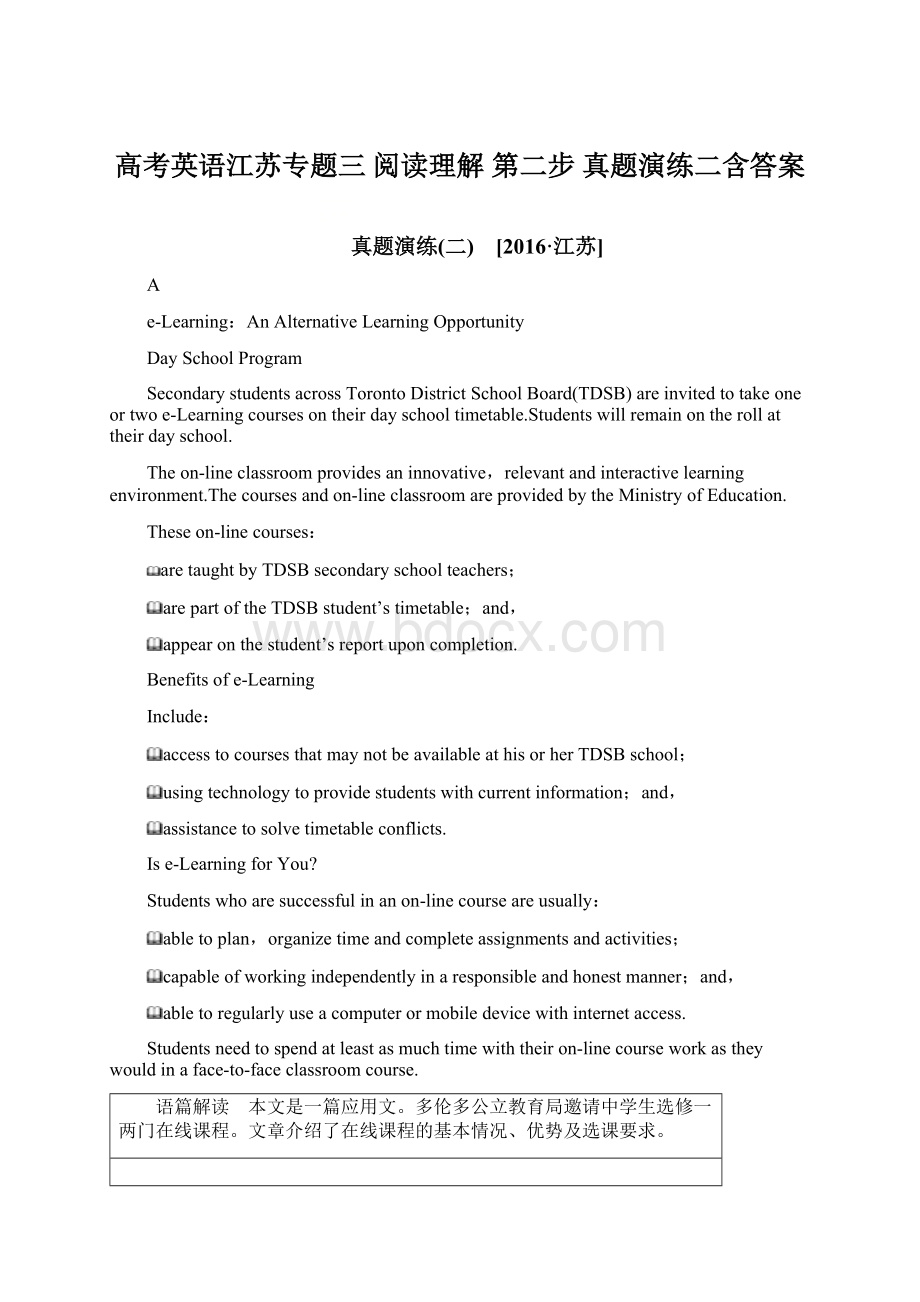高考英语江苏专题三 阅读理解 第二步 真题演练二含答案Word文档下载推荐.docx
《高考英语江苏专题三 阅读理解 第二步 真题演练二含答案Word文档下载推荐.docx》由会员分享,可在线阅读,更多相关《高考英语江苏专题三 阅读理解 第二步 真题演练二含答案Word文档下载推荐.docx(9页珍藏版)》请在冰豆网上搜索。

DaySchoolProgram
SecondarystudentsacrossTorontoDistrictSchoolBoard(TDSB)areinvitedtotakeoneortwoe-Learningcoursesontheirdayschooltimetable.Studentswillremainontherollattheirdayschool.
Theon-lineclassroomprovidesaninnovative,relevantandinteractivelearningenvironment.Thecoursesandon-lineclassroomareprovidedbytheMinistryofEducation.
Theseon-linecourses:
aretaughtbyTDSBsecondaryschoolteachers;
arepartoftheTDSBstudent’stimetable;
and,
appearonthestudent’sreportuponcompletion.
Benefitsofe-Learning
Include:
accesstocoursesthatmaynotbeavailableathisorherTDSBschool;
usingtechnologytoprovidestudentswithcurrentinformation;
assistancetosolvetimetableconflicts.
Ise-LearningforYou?
Studentswhoaresuccessfulinanon-linecourseareusually:
abletoplan,organizetimeandcompleteassignmentsandactivities;
capableofworkingindependentlyinaresponsibleandhonestmanner;
abletoregularlyuseacomputerormobiledevicewithinternetaccess.
Studentsneedtospendatleastasmuchtimewiththeiron-linecourseworkastheywouldinaface-to-faceclassroomcourse.
语篇解读 本文是一篇应用文。
多伦多公立教育局邀请中学生选修一两门在线课程。
文章介绍了在线课程的基本情况、优势及选课要求。
56.E-LearningcoursesaredifferentfromotherTDSBcoursesinthat.
A.theyaregivenbybestTDSBteachers
B.theyarenotonthedayschooltimetable
C.theyarenotincludedonstudents’reports
D.theyareanadditiontoTDSBcourses
答案 D
解析 细节理解题。
由Theseon-linecourses下的内容可知A、B、C三项表述均不正确;
根据Benefitsofe-Learning下的第一条“accesstocoursesthatmaynotbeavailableathisorherTDSBschool”可知,这些在线课程在TDSB课程中可能学不到,它们是对TDSB课程的补充。
故选D项。
57.Whatdostudentsneedtodobeforecompletinge-Learningcourses?
A.Tolearninformationtechnologyon-line.
B.Todotheirassignmentsindependently.
C.Toupdatetheirmobiledevicesregularly.
D.Totalkfacetofacewiththeirteachers.
答案 B
根据Ise-Learningforyou下的“Studentswhoaresuccessfulinanon-linecourseareusually...capableofworkingindependently...”可知,学生需要独立完成作业,与B项相符。
B
Chimps(黑猩猩)willcooperateincertainways,likegatheringinwarpartiestoprotecttheirterritory.Butbeyondtheminimumrequirementsassocialbeings,theyhavelittleinstinct(本能)tohelponeanother.Chimpsinthewildseekfoodforthemselves.Evenchimpmothersregularlydeclinetosharefoodwiththeirchildren,whoareablefromayoungagetogathertheirownfood.
Inthelaboratory,chimpsdon’tnaturallysharefoodeither.Ifachimpisputinacagewherehecanpullinoneplateoffoodforhimselfor,withnogreatereffort,aplatethatalsoprovidesfoodforaneighborinthenextcage,hewillpullatrandom—hejustdoesn’tcarewhetherhisneighborgetsfedornot.Chimpsaretrulyselfish.
Humanchildren,ontheotherhand,arenaturallycooperative.Fromtheearliestages,theydesiretohelpothers,toshareinformationandtoparticipateinachievingcommongoals.ThepsychologistMichaelTomasellohasstudiedthiscooperativenessinaseriesofexperimentswithveryyoungchildren.Hefindsthatifbabiesaged18monthsseeanunrelatedadultwithhandsfulltryingtoopenadoor,almostallwillimmediatelytrytohelp.
Thereareseveralreasonstobelievethattheurgestohelp,informandsharearenottaught,butnaturallypossessedinyoungchildren.Oneisthattheseinstinctsappearataveryyoungagebeforemostparentshavestartedtotraintheirchildrentobehavesocially.Anotheristhatthehelpingbehaviorsarenotimprovedifthechildrenarerewarded.Athirdreasonisthatsocialintelligencedevelopsinchildrenbeforetheirgeneralcognitive(认知的)skills,atleastwhencomparedwithchimps.IntestsconductedbyTomasello,thehumanchildrendidnobetterthanthechimpsonthephysicalworldtestsbutwereconsiderablybetteratunderstandingthesocialworld.
Thecoreofwhatchildren’smindshaveandchimps’don’tiswhatTomasellocallssharedintentionality.Partofthisabilityisthattheycaninferwhatothersknoworarethinking.Butbeyondthat,evenveryyoungchildrenwanttobepartofasharedpurpose.Theyactivelyseektobepartofa“we”,agroupthatintendstoworktowardasharedgoal.
语篇解读 本文是一篇说明文。
主要介绍的是通过实验对比了黑猩猩与人类在相互帮助的本能方面的巨大不同。
黑猩猩除了在某些方面偶尔合作外,在其他方面都是各顾各的,非常自私,而人却从小就知道帮助他人,善于与他人合作,这是人类独有的天性。
58.Whatcanwelearnfromtheexperimentwithchimps?
A.Chimpsseldomcareaboutothers’interests.
B.Chimpstendtoprovidefoodfortheirchildren.
C.Chimpsliketotakeintheirneighbors’food.
D.Chimpsnaturallysharefoodwitheachother.
答案 A
根据第一、二段可知,黑猩猩很少关心其他的黑猩猩,比如第二段中的例子:
随意吃邻居盘子里的食物,根本不关心邻居是否有东西吃,再结合第二段最后一句“Chimpsaretrulyselfish.”,可知与A项说法一致。
59.MichaelTomasello’stestsonyoungchildrenindicatethatthey.
A.havetheinstincttohelpothers
B.knowhowtoofferhel